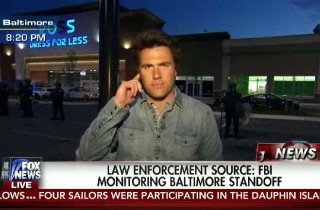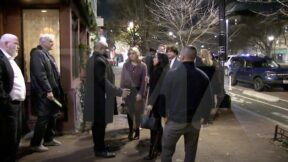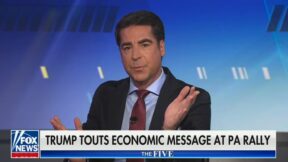‘Never Treat Pressure with Pressure’: Fox’s Leland Vittert Talks to Mediaite About His Baltimore Coverage
 While all three of the big cable news networks have reporters on-the-ground covering the turmoil in Baltimore, perhaps none have been as prolific as Fox’s Leland Vittert. The former Middle East correspondent moved back stateside last year and has been catapulted to round-the-clock appearances on the network during both peaceful and violent protests following the death of 25-year-old Freddie Gray in police custody.
While all three of the big cable news networks have reporters on-the-ground covering the turmoil in Baltimore, perhaps none have been as prolific as Fox’s Leland Vittert. The former Middle East correspondent moved back stateside last year and has been catapulted to round-the-clock appearances on the network during both peaceful and violent protests following the death of 25-year-old Freddie Gray in police custody.
Vittert made his mark Monday evening by standing among protesters, facing a silent line of riot police, while interviewing residents and demonstrators affected by the story in various ways. He has since broken news about the Baltimore mayor’s alleged stand-down orders for police, and has had some tense question-and-answer exchanges with lawmakers and public figures throughout the city.
Mediaite spoke to Vittert by phone on Thursday afternoon, shortly after he had a widely-publicized run-in with Rev. Al Sharpton. Read our brief Q&A below:
—
Before you became a Washington-based reporter, you were best known for your reporting from often hostile standoffs in the Middle East, particularly in Israel. How have those experiences informed how you went into a much milder, albeit still very tense, situation in Baltimore?
The first night in Baltimore had similarities to the Middle East and a war zone in the sense that it was a lawless time. You watched as police officers stood back, or, a police van drove by a liquor store getting looted and they’d get pelted with bottles and they’d just speed up and leave. Megyn Kelly said on-air that, “You never thought you’d see this in America.” And I certainly agreed with that.
But as for the experience, the more time you spend in hostile environments, the more aware you become of what’s going on in your surroundings. You can spend less time being scared and more time focusing on the story and getting the story right.
After that first night, we noted a sense of calm in how you approached people on the street to ask questions. It was very humanistic, never antagonistic, and, almost always, they immediately opened up to you. Why is that?
Well, folks are folks. When you walk up to somebody with your hand outstretched, saying, ‘Hi, my name is Leland,’ some won’t talk but almost everyone will readily share their feelings with you. I came down on the train that day and by 9 p.m. we were in rolling thunder. You need to very quickly try to put into words the emotions and fears, and that means hearing people talk.
Any particular on-the-ground interviews with residents or protesters stand out to you?
I remember those moments vividly. There was a black man by the name of Mac, who I interviewed twice. He must’ve been 6-foot-4-inches tall. And he and i were walking down his street — the street with all the looting and rioting — and we got to his green Maybach that rioters had smashed in. This is a man who works for every penny he has, and you saw the real toll that some people in the streets were causing to other real people who lived in their own community. I don’t think they were angry with Mac, for sure, but by God, he bared a real price for it.
There was also that man who showed you his police bean bag wounds on live television. It was very raw. He seemed very comfortable talking to you, especially after you politely asked him to stop cursing on-air and he realized you wanted to hear what he had to say. Do you prefer raw moments like that?
Look, if we can communicate to our viewers what’s happening on the ground in the rawest way possible, then we’ve succeeded. And I truly believe that the more you insert yourself into the story, the worse it gets. You’ve just got to be a conduit and let the moment play out in front of the viewer’s eyes. Obviously that man was angry, and he was in the vicinity of throwing things at the police, but, look, if somebody’s willing to take rounds from police bean bags, they must be pretty upset. And it is worth hearing why.
In an opinion piece, I praised you for handling very loaded questions from opinionated colleagues (most notably Sean Hannity) with aplomb. You had a way of translating these slightly antagonistic questions from your in-studio colleagues into very relatable, open-ended questions for residents on the street…
You realize over time that if you’re dealing with Israelis or Palestinians or the Libyan rebels or a failed suicide bomber [Yes, Vittert has actually spoken to one], being antagonistic or being hostile is not helpful.
As my grandfather used to say, ‘Never treat pressure with pressure.’ It doesn’t work. You can ask anything, but ask it in a way that is respectful or thoughtful. Let them say their piece. And if you treat people with dignity and respect, they are smart enough to realize that you have a reasonable question and they’ll go ahead and give you an answer.
How do you avoid being frightened while in a potentially hostile or dangerous situation?
You just try to calm down. You slow your thought process down, you slow your voice down, and you try to take a moment to really collect your thoughts. When you panic or when you are all amped up, and run right in there, you end up making bad decisions.
People take a lot of cues from the other person — if you’re calm, almost always they’re calm. If there’s somebody who might just slap you in the face, absolutely. you’ve got to be prepared for that. I’ve found that there’s not a lot of people who’d yell at you if you stick your hand out and just said, “Hi, I’m Leland and I want to hear your story.”
Also, when I was in the Middle East, i took up yoga. That really does help with being calm. There was a moment in Baltimore where people had these stolen cars and were and driving through the fires and doing donuts and whatnot, and one vehicle came right at me, and I remember just focusing on the car and yelling “Stoop stoop stoop!” for my crew to seek shelter on the steps of those old rowhouses. An inner calmness lets you think clearly and make decisions when things get tense.
Shortly before this phone call, you had a run-in with Rev. Al Sharpton and Baltimore Mayor Stephanie Rawlings-Blake. Tells us about that…
Well, the backstory is that I have a lot of police sources that said there was a stand-down order from the mayor: Hands off, don’t confront the rioters, don’t use lethal weapons. The quote I got was that she said “Let them loot, it’s only property.” It’s exactly what I witnessed on the ground on Monday. I watched the officers retreat. My reporting and what I witnessed jived completely. I also talked to business owners who were frustrated that their livelihoods weren’t protected. Officers were injured because the mayor had said you can’t wear protective gear, like turtle suits. That was also an order.
And when asked about it, the mayor obfuscated and so I wanted to put the question directly to her in a clear and calm manner. When we heard she was showing up to that event, we drove over, stood in the hall, and waited for her to come down. She walks out, Reverend Sharpton and other folks are there along with her, and I asked her if i can ask some questions.
She was the only one uninterested — and her security detail manhandled me. I asked her some quick questions, like, “What do you have to say about the stand-down order?” and she just wouldn’t respond. Rev. Sharpton got involved and told me that she’ll answer these at the conference. It’s worth noting that, at the actual event, the mayor spoke and ducked out before the promised press conference.
And now Sharpton is framing it as him struggling with a Fox News reporter?
If the reverend wants to insert himself somehow, I’ll leave that to him.
You only moved back to the United States in the past year. Any interesting stories about your time in Israel that we haven’t heard?
I’ll give you my first hostile environment story. I was in Israel on a house-hunting trip with my mother. I was at the American Colony Hotel in East Jerusalem, it was a Friday night in front of an oasis of calmness. We were having a drink, and then there was this sound of automatic weapons fire and I get down on the floor and I grab my mom down on the ground. And then I see no one else is on the ground.
The waiter looks at me, and laughs, and tells me, “It’s just a wedding, sir. It’s okay, it’s a celebration.” Okay, well, I’m thinking, welcome to the Middle East, huh? I’m sure my cowboy boots will fit in just fine here.
And in all seriousness, I’m truly grateful to Fox and to Roger Ailes for the opportunity to have been over there, starting when I was a 27-year-old kid. When I was first sent over there, Mr. Ailes asked me, “Do you really want to go?” I said, “Well, there’s some things you want to do and some things you have to do.” And he said, “Good luck, son.” But he added that if I ever get in a hairy situation, “You know, son, if something happens to you, I’m gonna come get you. I’m a little older so I don’t want to have to come get you. So be safe.”
I truly believe you are confident going into these situations because you know your employer would come for you. Knowing that Mr. Ailes had my back, that gave me enormous confidence to be focused on the story. It’s a good thing knowing that you work for a company that has your back and will move heaven and earth in any situation to secure your safety.
— —




